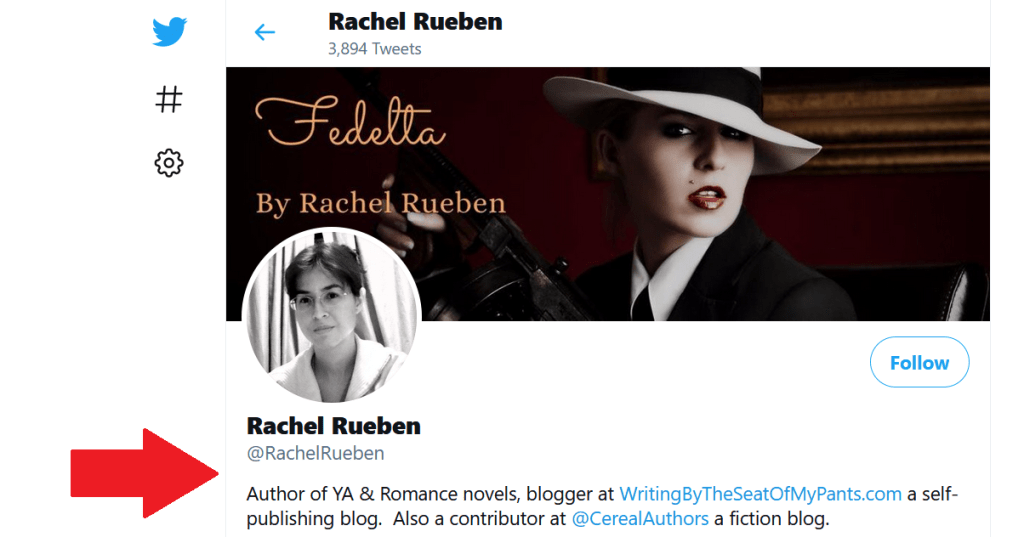
Updated: 2/26/2021
People are often shocked to learn that social media is just a giant database for marketers but it’s true, social media websites were literally designed to connect buyers with sellers. If you go to any social media site you’ll see a search engine where you can find people, companies and even discussion topics.
Last week, I showed you how to find keywords for your blog or website, and today, I’ll show you how to implement those keywords in your social media marketing and how to use metadata a.k.a hashtags to help you with your online SEO. So I’ll address the obvious question: How do you use keywords on social media?
Keywords in your Handle
Over the years authors have gotten crafty and added keywords to their social media handles to stand out from others who have the same name as their own. So if you’re author name isn’t available, instead of using @OfficialJonDoe or @RealJonDoe, like a lot of celebrities do, you can add a keyword like: AuthorJaneDoe or WriterJaneDoe. Here are a few examples of keywords in social media handles:
- @JDWritesErotica
- @RomanceAuthorJD
- @SciFiJohnDoe
- @RegencyJDoe
- @HistoricalJDoe
Keywords in your bio
Many authors include keywords in their bio for example I have on my Twitter account the keywords; author, romance, YA, blogger, self-publishing and fiction.

Keywords in your posts
Since social media companies started suppressing organic content in favor of paid content, authors are now adding things like hashtags to their social media posts to gain visibility. Over the years whenever the subject of hashtags comes up, the first question most authors have is: What is it? Simply put, a hashtag is defined as metadata, they exist on social media sites to make finding topics easier. It starts with the pound sign # and the subject, for example, if your new ebook is on sale you can use the hashtags; #KindleBook or #Deal so that the people looking for an inexpensive ebook can find your tweet easier.
Hashtags can also denote live discussions, for example, #KidLitChat is a live discussion that takes place on Tuesdays at 9 p.m., (on Twitter), where authors of children’s books can discuss the business of writing.
Like it or not, hashtags are important on social media, in fact, in one case study by Social Media Lab, discovered hashtags increased visibility by 70%. Hashtags have become so popular that you can now use them on sites like; Twitter, Facebook, Instagram, TikTok, Pinterest, and Youtube.
What Do You With A Hashtag?
You can use a hashtag for several reasons, one is to find book-related conversations but you can also use them to find influencers and attract others to your posts. Hashtags are keywords, for example, book reviewers often use the hashtag #bookreview at the end of their posts. So if you’re looking for information on author interviews, use the hashtag #authorinterview in the search engine to find interviewers. Now if you’re looking for readers here are the most popular hashtags used by those who love books:
More book hashtags to check out
- #WeekendReads (Hachette U.K.)
- #FridayReads
- #AmReading
- Bookstagram
- #FreeBook
- #Book
- #Ebook
- #GreatReads
- #MustRead
- #Goodreads
- #BookGiveaway
- #BookChat
- #Bibliophile
- #TeaserTues
- #BookLovers
- #Reading
- #Shelfi
- #BookWorm
- #Kindle
Hashtag Hijacking: A Cautionary Tale
As tempting as it is, you just can’t grab a hashtag that’s trending and make it apply to your book. Trust me, things can get ugly if you don’t know what you’re doing. A good example of hashtag hijacking involves the pizza company Digionios, who tweeted about pizza during a domestic violence discussion called: #WhyIStayed. The company’s brilliant contribution to the conversation was: “#WhyIStayed because you had pizza.” Needless to say, it wasn’t well received and the company had to apologize—repeatedly.
Note to authors: Always check out a hashtag before using it.
How to find popular hashtags on Twitter:
- AllHashTag
- Hashtracking.com
- Ritetag.com
- Hashtags.org
- Hashtagify.me
- Trendsmap (Tracks geographical trends)
Another Thing To Note
There have been multiple studies that claim more hashtags don’t necessarily equal more visibility. Going hashtag crazy is a problem particularly on Instagram where users sometimes put dozens of hashtags in one single post which some people find annoying. In marketing it’s always best to keep things simple because all of these keywords could distract from your message.
I think that’ll be all for this week, next time, I’ll share more SEO keyword tips for your book covers and discuss the topic of subtitles. If you want to learn more click below for part 1 & 3 of this series:
And if you found this post helpful, please like and share.


Comments are closed.